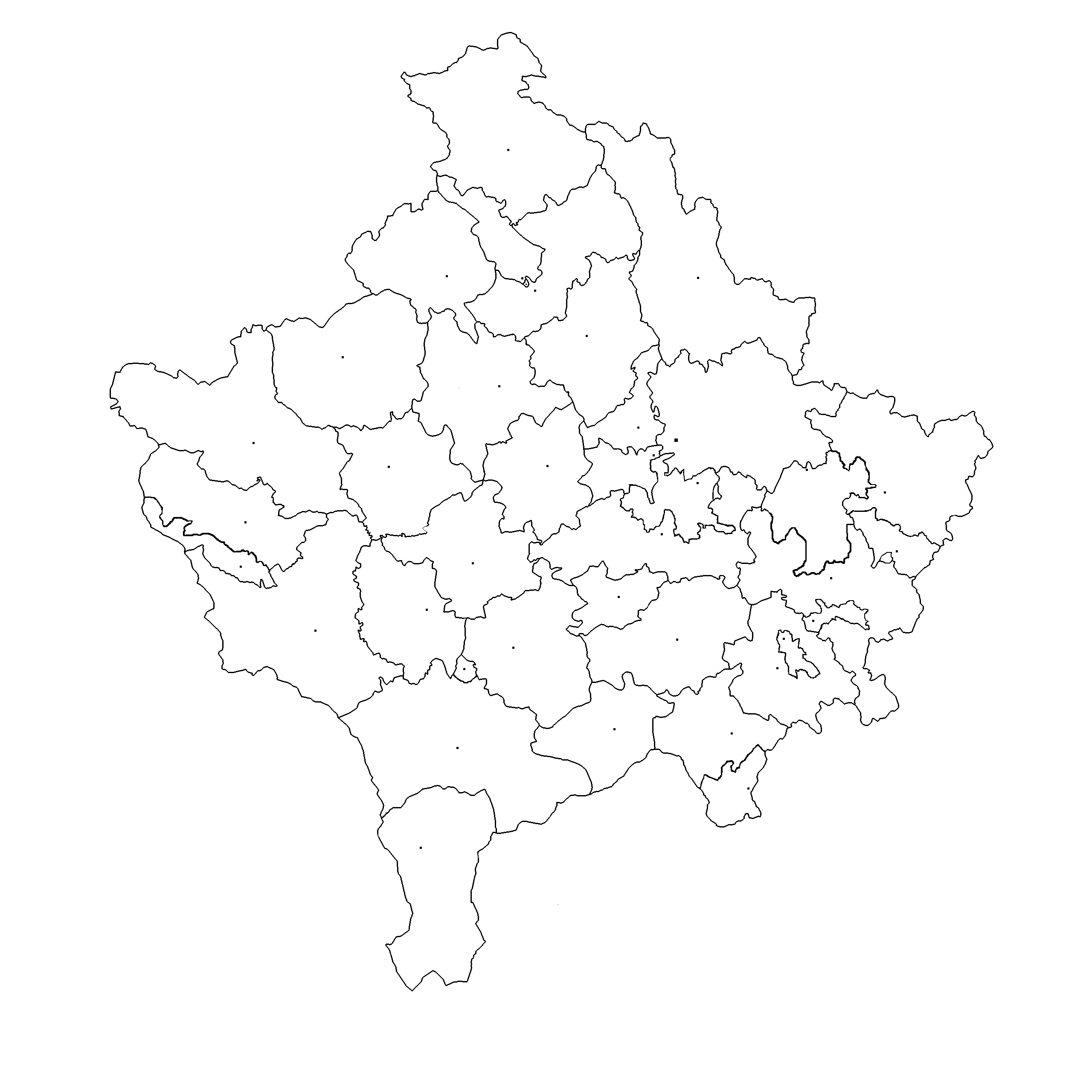
History of elections
History of local elections in Kosovo dates back to 2000, which marked the first elections held, followed by 6 local elections up to now (in 2002, 2007, 2009, 2013, 2017 and 2021). After the end of the war, the first elections at the local level were held on October 28, 2000, which were administered and supervised by OMIK (The OSCE Mission in Kosovo).
The second local elections were held on October 26, 2002. During 2002, UNMIK’s decision had been to postpone the mandate of Municipal Assemblies until 2007. As a result, joint central and local elections were held in 2007. The third local elections were held on November 17, 2007, which marked the first local elections organized by UNMIK/OMIK with temporary self-governing institutions, before Kosovo declared its independence.
Until 2007, citizens voted in closed lists for the parties that would be represented in the Municipal Assembly based on UNMIK Regulation 2000/45 (On the municipal self-governance). In this case, the municipal assembly members were elected by the Chairperson of the Assembly. Apart from exercising the duty in the Assembly, the Chairperson was also a representative of the Municipality. Whereas, the Chief Executive Officer held the executive role and was elected by the Municipal Assembly.
Since 2007, the amendment of the Regulation 2000/45 with that of 2007/30 (Amendment of the regulation no. 2000/45 on self-governance of Municipalities in Kosovo), the direct election system for the two municipal bodies was implemented: the Mayor and the Municipal Assembly. This was done through two different ballots; one for the mayor and one for the municipal assembly members in open lists for candidates. Meanwhile, the mandate received in 2007 was shortened and completed in 2009 due to the implementation of the decentralization process derived from the Ahtisaari President proposal for the status of Kosovo.
After the independence in Kosovo, the fourth local elections took place on November 15, 2009, organized by the Central Election Commission based on the Law on Local Self-Government, the Law on Local and General Elections in the Republic of Kosovo. On November 3, 2013, the fifth local election were held. The
2013 local elections mark the first time of local elections being held in every territory of Kosovo, including the Serb majority municipalities (North Mitrovica, Zveçan, Zubin Potok and Leposaviç).
The sixth local elections took place on October 22, 2017. There were 204 candidates running for Municipal Mayors and 7,080 candidates running for 1002 seats in the Municipal Assemblies. Out of 204 candidates for Municipal Mayors, 8 of them were women, however, none of whom received enough votes to lead one of the municipalities. Out of 38 municipalities, 20 of them entered the runoff voting/ballotage. Out of 1,353,613 registered voters, 516,573 or 38.10 % voted in the second round. After detected issues in the second round in the Municipality of Istog, it was re-voted on December 17, 2017.
The last Local Elections 2021
The most recent local elections in Kosovo were held on October 17, 2021. A total of 1.885.448 citizens were registered in the lists for local election voting (first round), while the number of those who voted was 799.958 or 42.50%. In the second round total of 1.260.517 citizens were registered in the lists for local election voting, while the number of those who voted was 477.089 or 37.85%.
These elections included 90 political entities, including: 32 political parties, 34 civic initiatives, one coalition and 23 independent candidates. There were 167 candidates running for Municipal Mayors and 7,080 candidates running for 1002 seats in the Municipal Assemblies. Out of 167 candidates for Municipal Mayors, 13 of them were women. Out of 38 municipalities, 21 of them entered the runoff voting/ballotage.
Out of 1.260.517 registered voters, 477.089 or 37.85 % voted in the second round.
Inauguration of Municipal Bodies
All (38) municipalities in the Republic of Kosovo have constituted the two main organs of the Municipality (The Municipal Assembly and the Mayor). This process is defined by the Law on Local Self-Government in two different matters. The first matter is related to the oath given by the members of the municipal assembly, as well as the Mayor, while the second matter is related to the election of the Chairperson of the Municipal Assembly and the constitution of its bodies.
The number of members in the municipal assembly is defined in points 1 and 2 of Article 36 in the Law on Local Self-Government. The number should be proportional, depending on the number of citizens in a specific municipality.
Up to 10,000 citizens - 15 members;
10,001 - 20,000 citizens - 19 members;
20,001 - 30,000 citizens - 21 members;
30,001 - 50,000 citizens - 27 members;
50,001 - 70,000 citizens - 31 members;
70,001 - 100,000 citizens - 35 members;
More than 100,000 - 41 members;
Municipal Assembly in Pristina consists of 51 members.
Inauguration
The first inauguration gathering of the Municipal Assembly is held within the first 15 days from the certification of election results. The first meeting of the Municipal Assembly is initiated by the elected Mayor of the Municipality. If the Mayor does not call the meeting within the deadline defined by Law, then the meeting will be called by the eldest Municipal Assembly member.
If for certain reasons, the Mayor and the eldest member do not call the meeting, then the majority of the members in the Municipal Assembly can initiate it. The members of the Municipal Assembly should be informed on the date, location and time that the session will take place at least seven days before. At the inaugural meeting, the Mayor, as well as the members of the Assembly will sign the oath. The inaugural assembly meeting is led by the oldest member of the Municipal Assembly.
Electing the Chairperson
The Chairperson of the Municipal Assembly shall be elected by the members of the Assembly with majority voting, at most 30 days after the constitution. In case none of the candidates receive the necessary votes in the first round, the two most voted candidates will enter the round-two.
The candidate who receives more than half of the votes by the present members, will be elected the Chairperson of the Municipal Assembly. In cases when the 30-day deadline is not met, the constitution is considered to be dis-functional, therefore the process will be followed with new elections for the Municipal Assembly.
